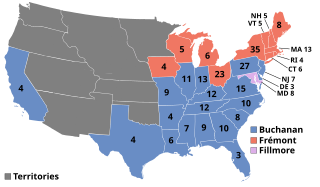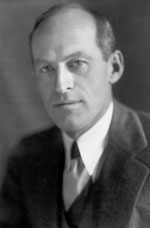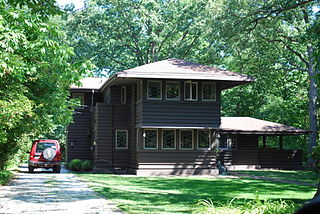
The 1856 United States presidential election was the 18th quadrennial presidential election, held on Tuesday, November 4, 1856. In a three-way election, Democrat James Buchanan defeated Republican nominee John C. Frémont and Know Nothing nominee Millard Fillmore. The main issue was the expansion of slavery as facilitated by the Kansas–Nebraska Act of 1854.

Walworth County is a county located in the U.S. state of Wisconsin. As of the 2020 census, the population was 106,478. Its county seat is Elkhorn. The county was created in 1836 from Wisconsin Territory and organized in 1839. It is named for Reuben H. Walworth. Walworth County comprises the Whitewater-Elkhorn, WI Micropolitan Statistical Area and is included in the Milwaukee-Racine-Waukesha, WI Combined Statistical Area. Lake Geneva, the University of Wisconsin-Whitewater, and Alpine Valley Resort, and Music Theatre are located in Walworth County.

Sugar Creek is a town in Walworth County, Wisconsin, United States. The population was 3,902 at the 2020 census. The unincorporated communities of Millard and Tibbets are located in the town. The unincorporated community of Abells Corners is also located partially in the town.

Millard Evelyn Tydings was an American attorney, author, soldier, state legislator, and served as a Democratic Representative and Senator in the United States Congress from Maryland, serving in the House from 1923 to 1927 and in the Senate from 1927 to 1951.

Joseph Hopkins Millard was a Canadian-American businessman and politician from Nebraska. He served in the United States Senate and as mayor of Omaha, and was an anti-suffrage activist.

Charles Dunsmore Millard was a Republican member of the United States House of Representatives from New York.
Isaac Leffler, sometimes spelled Lefler or Loeffler, was an American lawyer and Iowa pioneer who represented Virginia's 18th congressional district in the United States House of Representatives for one term in the 1820s. He also served in the legislatures of the Commonwealth of Virginia, as well as the Wisconsin and Iowa Territories. His younger brother, Shepherd Leffler, became one of Iowa's first congressmen after achieving statehood.

Millard Fillmore was the 13th president of the United States, serving from 1850 to 1853, the last to be a member of the Whig Party while in the White House. A former member of the U.S. House of Representatives from Upstate New York, Fillmore was elected as the 12th vice president of the United States in 1848, and succeeded to the presidency in July 1850 upon the death of U.S. President Zachary Taylor. Fillmore was instrumental in the passing of the Compromise of 1850, a bargain that led to a brief truce in the battle over the expansion of slavery. He failed to win the Whig nomination for president in 1852 but gained the endorsement of the nativist Know Nothing Party four years later and finished third in the 1856 presidential election.

The inauguration of Millard Fillmore as the 13th president of the United States, was held on Wednesday, July 10, 1850, at the House chamber inside the United States Capitol in Washington, D.C., following the death of President Zachary Taylor the previous day. This inauguration – the second non-scheduled, extraordinary inauguration to ever take place – marked the commencement of Millard Fillmore’s only term as president.
Joseph Warren Furber was a Whig politician in Minnesota. He was born in Farmington, New Hampshire. He helped with his family's farm and attended school before moving west in 1838. He lived in Alton, Illinois for two years, then worked in the lumber industry near St. Croix Falls, Wisconsin for another two years before settling in Cottage Grove, Minnesota.
Thomas Franklin Fairfax Millard was an American journalist, newspaper editor, founder of the China Weekly Review, author of seven influential books on the Far East and first American political adviser to the Chinese Republic, serving for over fifteen years. Millard was "the founding father of American journalism in China", and "the dean of American newspapermen in the Orient," who "probably has had a greater influence on contemporary newspaper journalism than any other American journalist in China.” Millard was a war correspondent for the New York Herald during the Spanish–American War, the Boer War, the Boxer Uprising, the Russo-Japanese War and the Second Sino-Japanese War; he also had articles appear in such publications as The New York Times, New York World, New York Herald, New York Herald Tribune, Scribner's Magazine, The Nation and The Cosmopolitan, as well as in Britain's Daily Mail and the English-language Kobe Weekly Chronicle of Japan. Millard was the Shanghai correspondent for The New York Times from 1925. Millard was involved in the Twain-Ament Indemnities Controversy, supporting the attacks of Mark Twain on American missionary William Scott Ament.

The George Madison Millard House, is a Frank Lloyd Wright designed Prairie School home that was constructed in Highland Park, Illinois, United States in 1906. It was the first of two houses that Wright would design for the Millards.
O'Cayz Corral was a downtown Madison, Wisconsin bar and music venue that featured local and national punk, rock, and grunge musical acts.

Fillmore is an unincorporated community in the Town of Farmington, Washington County, Wisconsin, United States. The community was settled in the early 1850s by a group of immigrants from Saxony.

The Wisconsin Naval Militia is the currently inactive naval militia of the state of Wisconsin. The Wisconsin Naval Militia served as a military reserve force for the state of Wisconsin, and was organized as a naval parallel to the Wisconsin National Guard.

The 1944 United States Senate election in Maryland was held on November 7, 1944. Incumbent Democratic U.S. Senator Millard Tydings was re-elected to a fourth term in office over Republican Blanchard Randall Jr.

The Third Wisconsin Legislature convened from January 9, 1850, to February 11, 1850, in regular session. Senators representing even numbered districts were newly elected for this session and were serving the first year of a two-year term. Senators representing odd numbered districts were serving the second year of their two-year term.















